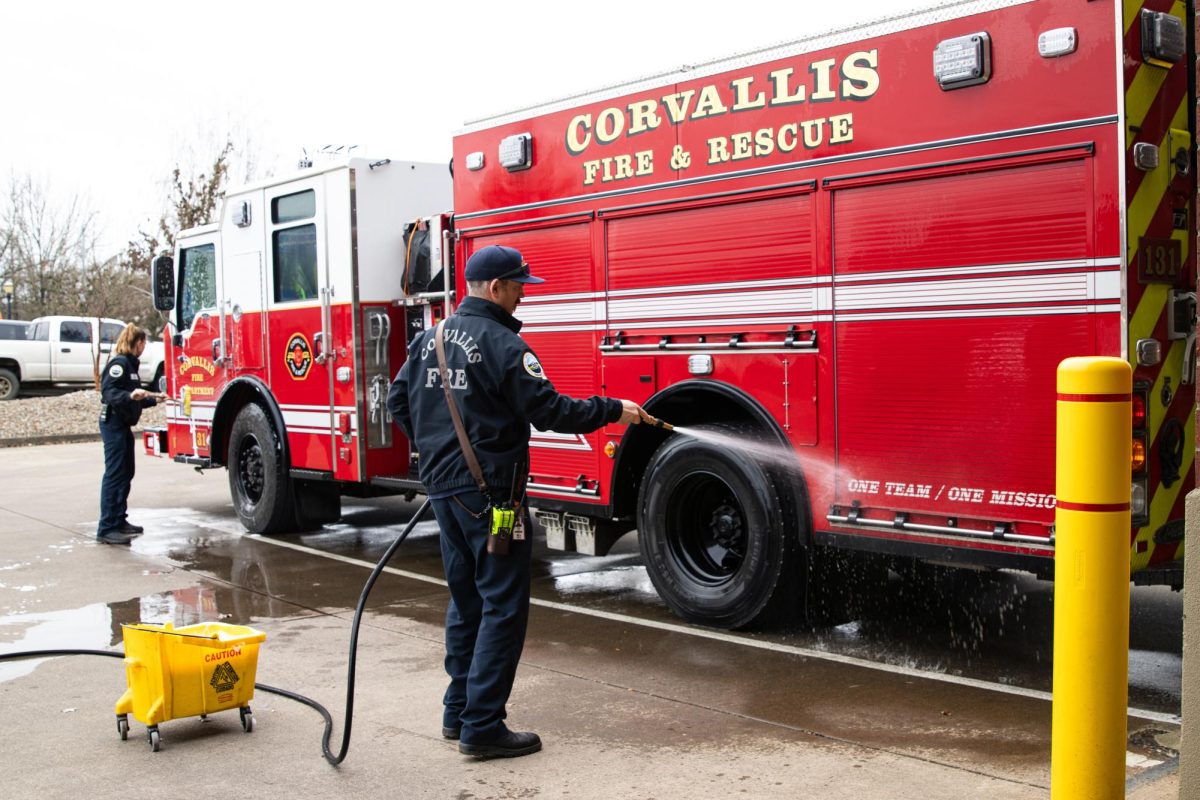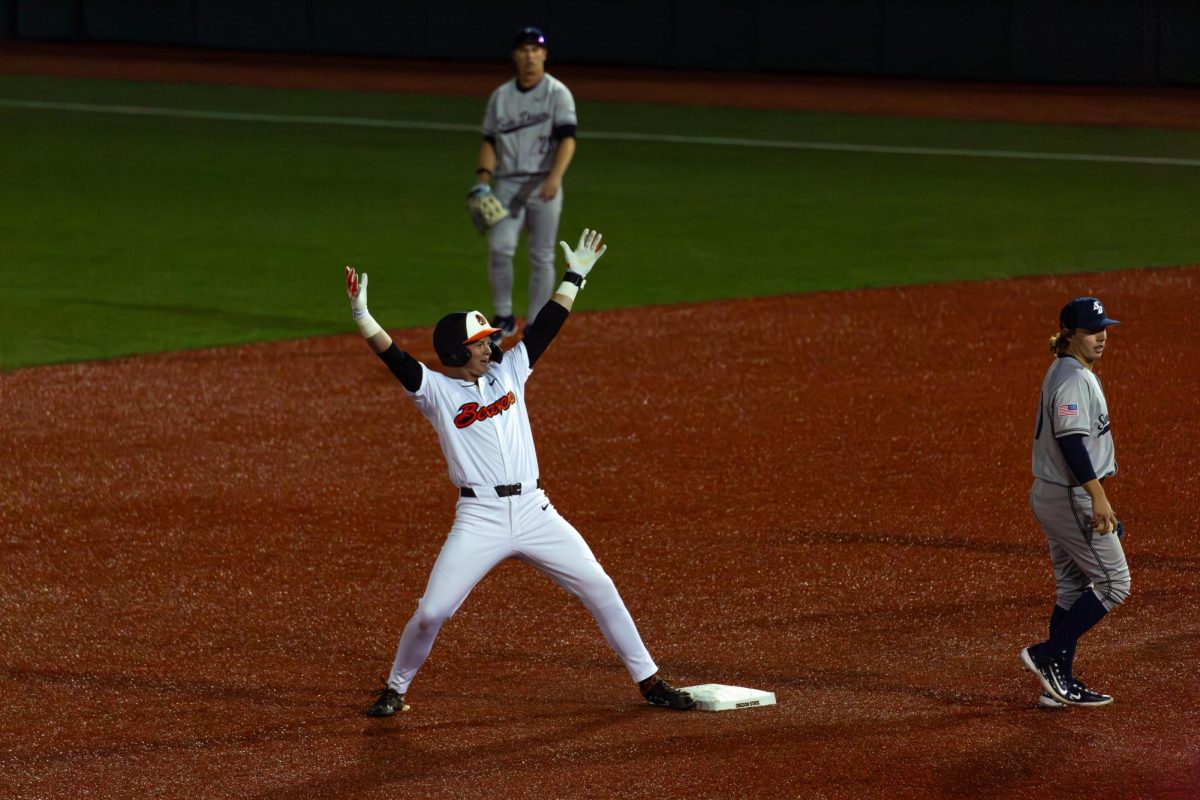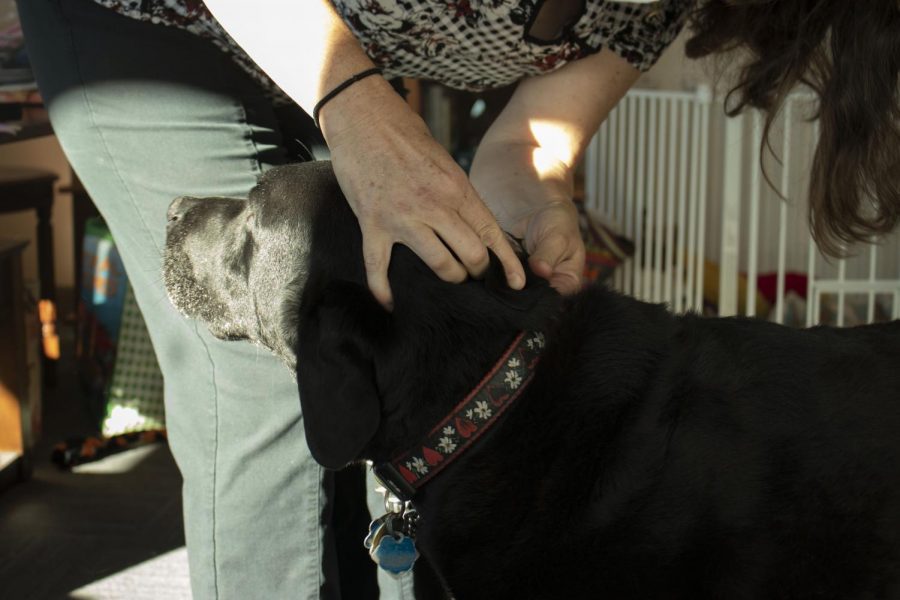COVID-19 continues to add pressure to local veterinarian services
Dr. Jennifer Barrington checks a Black Lab for an ear infection during a house call on Sept. 24, 2021 in Corvallis, Ore. Veterinarians have seen an unexpected uptick since the beginning of the COVID-19 pandemic and are still struggling to take care of their patients without long wait times.
October 4, 2021
COVID-19 continues to limit many industries services across the world, including veterinarian practices in Corvallis, Ore.
It is no surprise that veterinary hospitals are experiencing some heat from the global pandemic. Many veterinarians are experiencing longer wait and hold times, some are understaffed and others are not accepting new patients.
In Corvallis, most veterinary hospitals have implemented some sort of COVID-19 regulation. For example, the Willamette Veterinary Hospital is offering drop-off services, remote check-ins and email communication.
Susan Tornquist, the dean of Carlson College of Veterinary Medicine at Oregon State University, provided insight into what it is like for Corvallis community members and veterinarians during COVID-19. The CCVM offers a four-year professional program that grants students a doctor of veterinary medicine degree, as well as a graduate program which grants masters degrees in science and doctorates. In addition to the school’s many programs, the CCVM also runs a large animal hospital and a small animal hospital.
“The vast majority of our patients have no other connection with OSU,” Tornquist said. Most individuals who bring their pets to the CCVM Teaching Hospital are Corvallis community members.
Current wait times to register for an appointment at the CCVM Teaching Hospital depend on the care needed. For example, the small animal internal hospital is currently experiencing a wait time of two to three weeks for new appointments. Small animals that need orthopedic surgery are expecting wait times of about three months. Just like Willamette Veterinary Hospital, the CCVM Teaching Hospital offers emergency services to animals who need immediate attention.
“Both the large animal hospital and the small animal hospital decreased services when the pandemic hit though neither totally shut down,” Tornquist said.
The CCVM Teaching Hospital is slowly returning to normal, but is still extremely busy.
“It is very stressful to work very hard and long hours constantly and that is what our staff have been doing,” Tornquist said. “They are all very compassionate and do not like to turn away any patients, but they only have so many hours in the day.”
In addition to the new COVID-19 guidelines, there are a few other causes that have contributed to the increased pressure veterinarians face.
“People adopted pets during the pandemic and then spent a lot more time with them, thus noticing possible health problems and scheduling veterinary services,” Tornquist said. “In addition, regular veterinarian appointments were often delayed during the lockdown.”
Individuals who are new to the area may experience an extra burden in scheduling veterinarian services.
“I tried calling a variety of places,” Jacob Burwell, an OSU student who recently moved to the Corvallis area, said. “It has been difficult to find a clinic to take my cat Snowball. However, I have to wait over a month for a new appointment.”
To illustrate, in Albany, Ore., the only business accepting new patients is Reid Veterinary Hospital, according to a front desk representative at the facility. The soonest available appointment is one month away.
OSU Alumni Dr. Jennifer Barrington graduated from OSU and Washington State University in 2002 as a small animal veterinarian and is now the owner of House Call Pet Services in Corvallis. Barrington faces different challenges than a typical veterinarian would because she offers veterinary services at people’s homes.
Unlike other veterinarians, when people contact Barrington, they can immediately talk to the veterinarian who will actually be caring for their pet.
Barrington has had to adopt some COVID-19 safety guidelines, but is available to take on new patients. In addition to Corvallis community members, Barrington takes on many OSU students as clients.
“I have many OSU students that have used my services,” Barrington said. “Mostly, we are meeting in between classes at their house.”
Other than adjusting to a new fall schedule with three children, Barrington provides an alternative veterinary service that community members may find more accessible than normal veterinarian clinics during the pandemic. Seven local veterinarians in Corvallis were contacted for comment about how they are dealing with COVID-19, but were unable to respond in time for publication.
“COVID-19 restrictions have slowed down the efficiency of veterinary services, some employees of veterinary clinics have quit because of overwork, burnout,” Tornquist said.
Veterinarians are adjusting to the impacts COVID-19 has had on their facilities.
“Try to understand that we are working as hard as we can, and we genuinely care about your pet,” Tornquist said. “Getting upset or being rude to faculty, staff or students is not going to result in better or quicker service for your pet.”
















































































![Newspaper clipping from February 25, 1970 in the Daily Barometer showing an article written by Bob Allen, past Barometer Editor. This article was written to spotlight both the student body’s lack of participation with student government at the time in conjunction with their class representatives response. [It’s important to note ASOSU was not structured identically to today’s standards, likely having a president on behalf of each class work together as one entity as opposed to one president representing all classes.]](https://dailybaro.orangemedianetwork.com/wp-content/uploads/2025/03/Screenshot-2025-03-12-1.00.42-PM-e1741811160853.png)
























